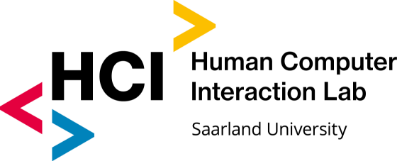Seminar: Interactive Robotics / Winter term 2022
| Type | Seminar (7CP) | |
| Time | tba | |
| Place | tba | |
| Language | English | |
| Links | tba |
Description
As robots are becoming pervasive, a question of ever increasing importance is how people can best interact with robots, to solve tasks intuitively and effectively. Within the past few years, the wide availability of accessible hardware platforms for prototyping and digital fabrication tools have made it easier to develop interactive robotic systems. A variety of robotic devices and applications are now finding their way to end-users. Robots have the potential to enhance human performance, augment the human body and offer unique new opportunities for interaction with our physical environment and other people. This course focuses on state-of-the-art technologies for human-robot interaction alongside key questions regarding how to interact with robots in our day-to-day life.
The goal of this seminar is to acquire basic conceptual and practical skills in developing an interactive robotic system for human use.
Activities
This seminar combines conceptual basics and theory with a practical team project:
To make you familiar with important conceptual and technical foundations, the seminar will involve reading activities, done individually by each student. For every reading activity, you will read one or more seminal research papers and hand in a brief written report that discusses these papers. Reports should summarise the key aspects, and more importantly, should include original and critical thought that show you have acquired a meta-level understanding of the topic.
Participants will work in small groups on a practical project. They can choose either a software-focused or a hardware-focused topic. Software projects will use existing robotic hardware to design and implement innovative human-robot interactions in software. In contrast, hardware projects will focus on developing a visionary robotic hardware system, e.g., with interactive e-textiles or 3D-printed meta-materials.
Creativity, ideation, and experimentation will be essential aspects of the project phase. We will present a list of potential project topics during the kick-off session. Students can choose from these or propose their own ideas for projects. Our experience is that developing your own solution within a team of students can be a lot of fun and lead to impressive results; some of our past student projects have gained remarkable attention on the web and even have received awards (see for instance Interactive Jacket for Cyclists, Interactive Dancing Socks, Ambient Flower, Sprinter). We’ll help you to realize a great project.
Covid-19
Due to Covid-19, we anticipate that the seminar will take place both remotely and on-site. A purely remote, online participation is not possible in this course, as this seminar involves work with hardware. The plenary meetings will take place remotely. Individual group meetings will be held on-site or remotely, depending on the current project phase, the team’s preferences, and the pandemic situation.
Registration
Please note that because of the close individual supervision the number of participants is limited to 16! Please register through the seminar portal offered by the computer science department
https://seminars.cs.uni-saarland.de/seminars2223 . This is a master-level seminar, which can also be taken by Bachelor students from 5th study semester and above.
For registration, we require you to submit a brief motivation statement that elaborates on why you want to take this class. Please indicate if you prefer to do a software project or a hardware project, or any of them. For our hardware-related topics, you are required to have basic experience in hardware programming (e.g., Arduino) and simple electronics. It’s advantageous but not strictly required to have passed Interactive Systems. For our software-related topics, we don’t expect any prior experience with hardware.
Literature and Materials
All the reading material and resources will be made available on Moodle.


